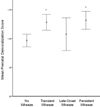Relationship between maternal demoralization, wheeze, and immunoglobulin E among inner-city children
- PMID: 21704884
- PMCID: PMC3135280
- DOI: 10.1016/j.anai.2011.03.004
Relationship between maternal demoralization, wheeze, and immunoglobulin E among inner-city children
Abstract
Background: Prior research has linked maternal prenatal and postnatal mental health with the subsequent development of asthma in children. However, this relationship has not been examined in inner-city African Americans and Hispanics, populations at high risk for asthma.
Objective: To determine the relationship of maternal demoralization with wheeze, specific wheeze phenotypes, and seroatopy among children living in a low-income, urban community.
Methods: African American and Dominican women aged 18 to 35 years residing in New York City (the Bronx and Northern Manhattan) were recruited during pregnancy (n = 279). Maternal demoralization (ie, psychological distress) was measured both prenatally and postnatally by validated questionnaire. Outcomes included wheeze, transient (birth to 2.5 years of age), late onset (3-5 years), and persistent (birth to 5 years of age), evaluated via questionnaire and total and indoor allergen specific IgE (at birth and ages 2, 3, and 5 years). Logistic regression with generalized estimating equations assessed the association of demoralization with wheeze and atopy. Multinomial regression explored associations between demoralization and specific wheeze phenotypes.
Results: Prenatal demoralization significantly predicted overall wheeze (adjusted odds ratio OR, 1.66; 95% confidence interval [CI], 1.29-2.14), transient wheeze (OR, 2.25; 95% CI, 1.34-3.76), and persistent wheeze (OR, 2.69; 95% CI, 1.52-4.77). No association was found between demoralization and IgE after adjustment (total IgE: OR, 1.04; 95% CI, 0.74-1.45; any specific IgE: OR, 0.96; 95% CI, 0.57-1.60).
Conclusions: In this inner-city cohort, prenatal demoralization was associated with transient and persistent wheeze. Understanding how maternal demoralization influences children's respiratory health may be important for developing effective interventions among disadvantaged populations.
Copyright © 2011 American College of Allergy, Asthma & Immunology. Published by Elsevier Inc. All rights reserved.
Figures
References
-
- Leao LL, Zhang L, Sousa PL, et al. High prevalence of depression amongst mothers of children with asthma. J Asthma. 2009;46:388–391. - PubMed
-
- Milam J, McConnell R, Yao L, Berhane K, Jerrett M, Richardson J. Parental stress and childhood wheeze in a prospective cohort study. J Asthma. 2008;45:319–323. - PubMed
-
- Wright RJ, Cohen S, Carey V, Weiss ST, Gold DR. Parental stress as a predictor of wheezing in infancy: a prospective birth-cohort study. Am J Respir Crit Care Med. 2002;165:358–365. - PubMed
Publication types
MeSH terms
Substances
Grants and funding
- P01 ES009600/ES/NIEHS NIH HHS/United States
- P50 ES015905/ES/NIEHS NIH HHS/United States
- ES013543/ES/NIEHS NIH HHS/United States
- 5P50ES015905/ES/NIEHS NIH HHS/United States
- R01 ES014393/ES/NIEHS NIH HHS/United States
- R01 ES008977/ES/NIEHS NIH HHS/United States
- ES01493901/ES/NIEHS NIH HHS/United States
- R01 ES013163/ES/NIEHS NIH HHS/United States
- R01ES013163/ES/NIEHS NIH HHS/United States
- 5P01ES09600/ES/NIEHS NIH HHS/United States
- R01 ES013543/ES/NIEHS NIH HHS/United States
- 5R01ES08977/ES/NIEHS NIH HHS/United States
LinkOut - more resources
Full Text Sources
Medical


